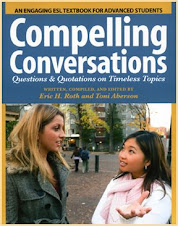Saturday, September 20, 2008
Who ranks ESL programs? How would you choose an English language school?
Hundreds of thousands of students travel thousands of miles each semester to attend ESL schools. These intensive English language programs, often affiliated at universities, provide an opportunity to study English, live abroad, and prepare for the all-important TOEFL test. Given the importance of English to the business, scientific, and political events, the ability to read, write, and speak English often seems mandatory to ambitious 21st century students.
Yet, like any consumer product, the quality of the schools widely varies. How would a student make a rational choice?
This question emerged as I spoke with several dozen international students this week about their resumes, educational backgrounds, and training in English. While this elite group of mostly graduate students had succeeded in the academic game, several shared stories of unpleasant experiences at language schools. Sometimes students found a huge gap between their expectations and their actual American classroom experiences.
The apparent randomness of significant decisions often surprises me. Normally, I consult friends and established rankings as part of a decision making process. Yet a single thin piece of information, or casual conversation, can easily alter plans. Still I remember systematically searching through numerous guidebooks while selecting my college.
Where can students looking for a quality English language programs abroad find this sort of information? Does TESOL have some list of approved or sanctioned schools? Does somebody else – perhaps even local governments – track the effectiveness of schools? Further, what is their criteria? Where can individuals – students, teachers, parents – get that simple, yet vital bit of information? Is any of this information available in English, instead of the first language?
I would suspect, especially for international students of considerable income, that there would have to be somebody who attempts to grade, evaluate, and rank ESL schools. If I was going to travel to the United States, Australia, or the United Kingdom, I would certainly want to know the quality of the program and teachers. Even I was just going to a local English school or attending a public adult education center, I would still check on the school's reputation. Of course, recruiters provide some information too – often with a twist. Given the potential investment in money and time, I assume that guides must exist – and probably not in English.
The best English language source that I have found, so far, is a site called http://www.eslreview.org/ . It rates schools on a scale of 1-5 on teaching, location, housing services, price-quality relationship, and overall satisfaction. You can find basic information and read student reviews. You can also browse through the course catalog and contact the schools. This website review is a starting point, but not much more. The listings look like they could easily be gamed. They also don’t list school accreditations, average TOEFL scores, or hire staff to inspect the schools. Further, the list doesn’t include some prominent IEP schools in California. So it’s a valuable starting point to compare ESL schools, but it is hardly a Petersen’s Guide to IEP programs.
Does anybody know a better resource in English?
Ask more. Know more. Share more.
Create Compelling Conversations.
Visit www.CompellingConversations.com
Sunday, March 30, 2008
The Center for Applied Linguistics Suggests Workshops at TESOL
How do you choose which of the many tempting ESL workshops at an international convention of ESL teachers and researchers?
As part of my preparation for the TESOL convention, I checked the
a list of recommended workshops by CAL researchers. As ever, the Center for Applied Linguistics website provides some practical suggestions.
“World of TESOL, Worlds of Refugees”, “Strategies for Serving High Advanced Adult ESL Students”, and “Building Academic Language Through Scaffolded Instructional Conversations”, and “Analyzing Oral Proficiency to Guide Instruction” sound like sensible, smart choices. “Applying Teacher Input to Improve Assessment” also sounds like an excellent idea. Two other workshops that caught my eye, “Interested in Working as as ESOL Consultant” and “Connecting Culture and Language in ELL Instruction”, but I’m not going to any workshops that start at 7:30 AM or 7:30 PM while visiting New York City.
Please visit www.CompellingConversations.com .
Thursday, March 27, 2008
Are you going to the TESOL convention next week?
Are you going to the TESOL conference next week? Did you see all those narrow, niche topics? Have you created a schedule? How did you decide which workshops to attend?
Personally, I found the selections simply overwhelming. For work, I'm going to focus on the workshops on testing language skilsl, especially oral skills and writing. For personal interest, I'll probably go to the workshops on technology and ESL. I might also wander into a few workshops on the internationalization of higher education. But consider me flexible. Do you have any recommendations?
For now, I’m playing it by ear.
Eric
eric@compellingconversations.com
www.compellingconversations.com





